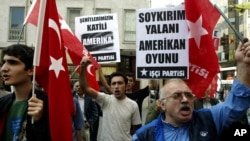Ankara is becoming increasingly concerned about whether U.S. President Barack Obama will follow Pope Francis and the EU parliament in using the word "genocide" on the 100th anniversary (April 24) of the start of the mass killings of Armenians. A senior Turkish official warns that political and military steps will be taken if the word "genocide" is used.
Turkish Foreign Minister Mevlut Cavusoglu was dispatched to Washington to meet with his U.S. counterpart John Kerry to lobby against President Obama using the word "genocide" in his annual address on the mass killings of Armenians during World War I.
Ankara is becoming increasingly alarmed that there is a growing momentum to recognize the killings as genocide among its allies, says Semih Idiz, diplomatic columnist for the Turkish newspaper Taraf and the Al Monitor web site.
"Well, following the statement of the pope and the non-binding resolution of the European parliament, and now the German parliament is about to adopt (a) similar resolution, they are worried, worried enough to send the foreign minister to Washington to sound out John Kerry and try (to) lobby (the U.S.) Congress in this regard," said Idiz. "So, yes, they are worried."
Ankara vehemently denies the charge of genocide, saying the deaths occurred in a civil war, in which many Turks died, too. But Prime Minister Ahmet Davutoglu this week expressed condolences to Armenians whose relatives were killed.
Columnist Idiz says why Ankara is strongly resisting the genocide claim, as that could open the door to numerous court cases.
"They look on the term genocide as a legal term and if its gains broad acceptance then fear is Armenians and Armenia will use this in international courts against Turkey," said Idiz.
Observers say there are numerous compensations claims in U.S. courts dependent on the recognition of the genocide. But Ankara is fighting back. A senior Turkish official speaking on condition of anonymity warned there were easy and practical steps that could be taken against Washington if President Obama uses the term "genocide".
U.S. forces use the Turkish air base of Incirlik close to Syria and Iraq, while Turkey holds important U.S. radar installations.
But political scientist Cengiz Aktar of Istanbul’s Suleyman Sah University says Ankara's response will be muted.
"They keep threatening all sorts of retaliation, but besides calling the ambassador back, nothing significant," said Aktar. "After all, these countries that recognize it as a genocide are Turkey’s top allies and partners. So how can Turkey react negatively to all this? It would be very difficult."
Ankara currently has tense or no diplomatic relations with most of its southern neighbors and ties with the European Union are also strained.
Regional analyst says until recently many of Turkey’s allies avoided recognizing genocide claims because of Turkey’s strategic importance as a close ally. But political scientist Aktar says the growing momentum for recognizing the deaths as genocide is a sign of Turkey's growing isolation.
"For the Turkish government the main and key lesson to be drawn out of this is that Turkey is not considered a reliable ally anymore," said Aktar.
Despite its growing isolation, Turkey is still an important strategic ally. Analysts say given Turkey's borders with Syria and Iraq, it is key to stemming the growing numbers of would-be jihadists seeking to join the Islamic State.




